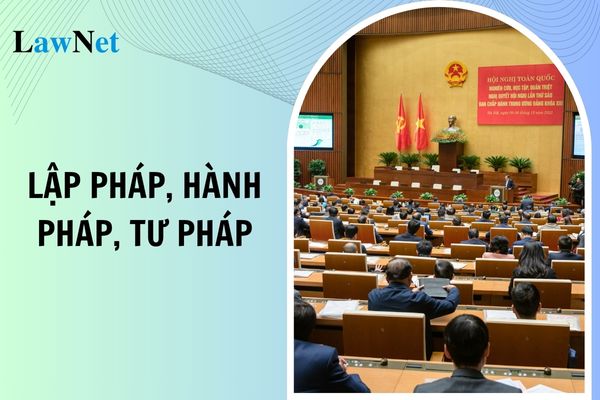What are regulations on legislative power, executive power, and judicial power in Vietnam?
What are regulations on legislative power, executive power, and judicial power in Vietnam?
Legislative, executive, and judicial powers are the three branches of state power. In Vietnam, these powers are defined as follows:
1. Legislative Power:
- Definition: Legislative power is the power to enact laws, including making and amending laws.
- Executing Body: According to Article 69 of the 2013 Constitution, the National Assembly is the body exercising legislative power.
2. Executive Power:
- Definition: Executive power is the authority to execute and manage laws, ensuring legal provisions are implemented.
- Executing Body: Pursuant to Article 94 of the 2013 Constitution, the Government of Vietnam, headed by the Prime Minister, exercises executive power.
3. Judicial Power:
- Definition: Judicial power is the authority to protect the law, including adjudicating legal violations and resolving disputes.
- Executing Body: Article 102 of the 2013 Constitution stipulates that the People's Court is the body exercising judicial power.

What are regulations on legislative power, executive power, and judicial power in Vietnam? (Image from the Internet)
What does legal education content in Vietnam include?
Based on Article 6 of the Law on Popularization and Legal Education 2012, the content of legal education includes:
- Developing and promulgating legal normative documents, programs, and plans for the popularization and education of the law;
- Directing, guiding, and organizing the implementation of the work of popularizing and educating the law;
- Enhancing legal knowledge and legal education skills;
- Developing and managing the national legal database;
- Compiling statistics and summarizing the popularization and education of the law;
- Inspecting, examining, resolving complaints, denunciations, and handling violations in the popularization and education of the law;
- International cooperation on the popularization and education of the law.
What are prohibited acts in the field of legal education in Vietnam?
According to Article 9 of the Law on Popularization and Legal Education 2012, the prohibited acts in the field of legal education include:
- Misrepresenting, criticizing the content of laws being disseminated; failing to provide information and materials as prescribed by law; providing false, unlawful, unethical, or anti-traditional information, and materials.
- Exploiting the popularization and education of the law to distort the policies and guidelines of the Communist Party, the laws of the State; propagating hostile policies, causing division of national unity; infringing upon the interests of the State, the lawful rights, and interests of agencies, organizations, individuals.
- Obstructing the exercise of the citizens' right to information, understanding, and learning about the law, and the activities of popularizing and educating the law by agencies, organizations, individuals.
- Taking advantage of the exercise of the right to information, understanding, and learning about the law to obstruct the normal activities of agencies, organizations, individuals, causing disorder and social insecurity.
What are forms of popularizing legal education in Vietnam?
Based on Article 11 of the Law on Popularization and Legal Education 2012, there are 8 forms of legal education dissemination, including:
- Press conferences, press releases.
- Direct dissemination of laws; consulting, guiding legal understanding; providing legal information and materials.
- Through mass media, loudspeakers, the internet, billboards, posters, propaganda paintings; publishing in the Official Gazette; posting legal information on electronic portals; listing at offices and bulletin boards of agencies, organizations, residential areas.
- Organizing legal understanding contests.
- Through adjudicating, handling administrative violations, public reception activities, settling citizens' complaints and denunciations, and other activities of agencies within the state machinery; through legal aid activities, grassroots conciliation.
- Integrating legal education activities in culture, arts, activities of political organizations, associations, clubs, legal bookcases, and other cultural facilities at the grassroots.
- Through legal education programs in educational institutions of the national education system.
- Other appropriate forms for specific objects that competent agencies, organizations, or individuals can apply to ensure the effectiveness of legal education dissemination.

